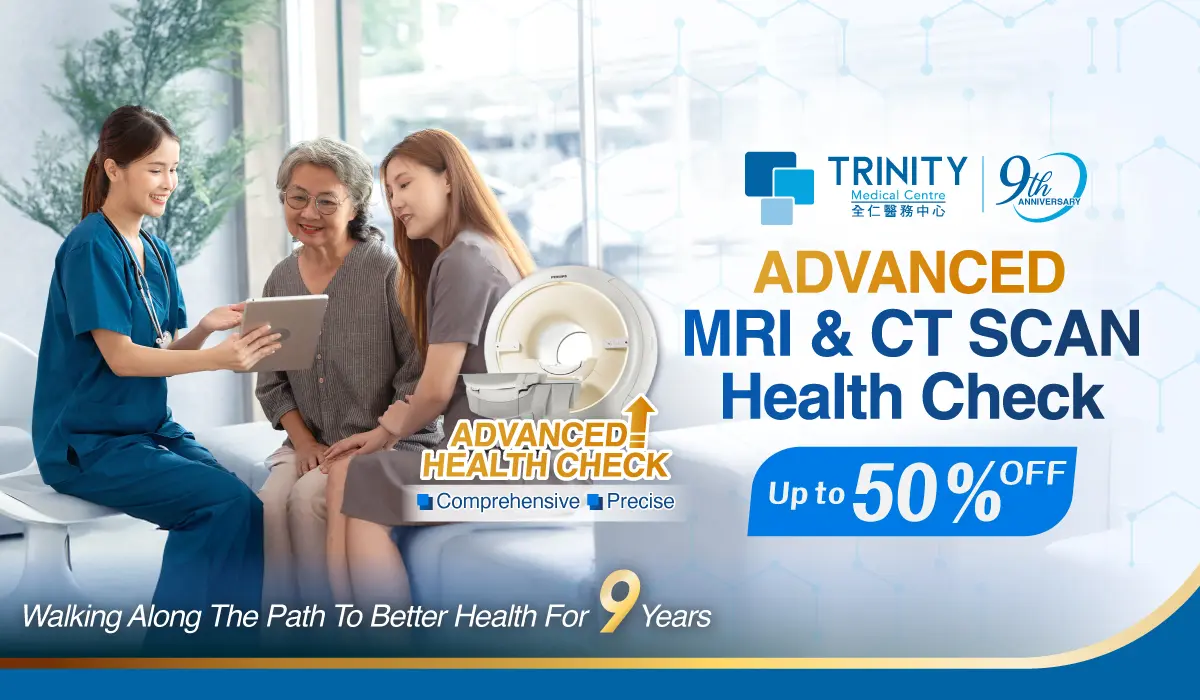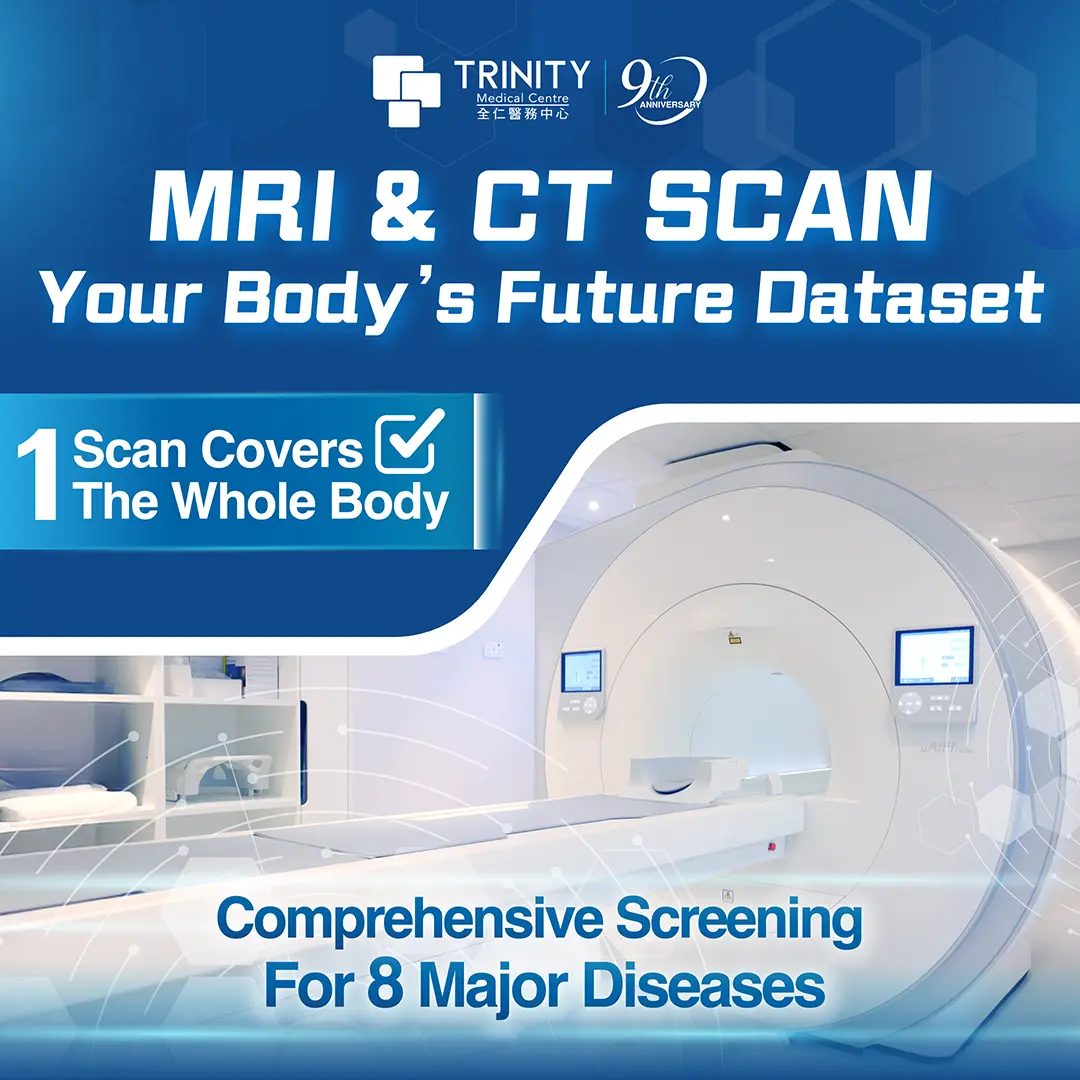MRI & CT Scan
Your Body’s Future Dataset
Trinity Medical Centre Celebrates 9 Years: Advanced Scans for Your Body’s Future Dataset
To celebrate our 9th anniversary, Trinity Medical Centre is proud to introduce upgraded Magnetic Resonance Imaging (MRI) and Computed Tomography (CT) health check plans covering the head, neck, lungs, heart, abdomen, pelvis, spine, cranial joints, and knees. Utilizing state-of-the-art diagnostic imaging technology, our precise analysis evaluates risks for early-stage cancers, stroke, cardiovascular diseases, and other critical illnesses.
MRI and CT scans provide a comprehensive look inside your body, giving you control over your body’s future health data.
Key Features
Brain and Cervical Blood Vessels
Utilizing advanced Magnetic Resonance Angiography (MRA) technology to thoroughly assess the health of brain and cervical blood vessels. This helps in the early detection of brain tumors, cerebral hemorrhages, vascular stenosis, and blockages.
Lungs and Thoracic Health
Low-dose Lung CT (LDCT) provides detailed imaging of the lungs and thoracic cavity, aiding in the early detection of respiratory system issues, cardiovascular diseases, and potential tumors.
Heart Health
Advanced Cardiac CT Angiography (CTCA) scans coronary artery calcifications to evaluate heart conditions and assess cardiovascular risks (heart disease).
Bones & Joints
Whole-body Magnetic Resonance Imaging (MRI) effectively detects spinal disc herniation, arthritis, joint inflammation, fractures, and bone tumors.
Advanced Medical Scan
-
Magnetic Resonance Imaging (MRI)
-
Computed Tomography (CT)
-
3D Mammography
-
Ultrasound
-
X-Ray
All-In-One Plan For A Full Body Scan
Top Choice For Comprehensive Health Screening

Whole-body MRI
Key Screening
- Tumors and Cancers
- Neurological Diseases
- Cerebrovascular Disease
- Musculoskeletal Diseases
- Visceral Organ Diseases
- Vascular and Lymphatic Abnormalities
- Infections or Inflammations
- Congenital Diseases or Developmental Abnormalities
- Stroke Risk
- Coronary Artery Disease (Heart Disease)
- Acute Coronary Syndrome Integrated Assessment
- Myocardial disease
- Cardiac Structural Abnormalities
- Lung Cancer
- Benign Lung Lesions

Whole-body MRI
MRI Stroke Screening
Key Screening
- Tumors and Cancers
- Neurological Diseases
- Cerebrovascular Disease
- Musculoskeletal Diseases
- Visceral Organ Diseases
- Vascular and Lymphatic Abnormalities
- Infections or Inflammations
- Congenital Diseases or Developmental Abnormalities
- Stroke Risk
- Coronary Artery Disease (Heart Disease)
- Acute Coronary Syndrome Integrated Assessment
- Myocardial disease
- Cardiac Structural Abnormalities
- Lung Cancer
- Benign Lung Lesions

Whole-body MRI
Cardiac CT Angiography (CTCA)
Low-dose Lung CT (LDCT)
Key Screening
- Tumors and Cancers
- Neurological Diseases
- Cerebrovascular Disease
- Musculoskeletal Diseases
- Visceral Organ Diseases
- Vascular and Lymphatic Abnormalities
- Infections or Inflammations
- Congenital Diseases or Developmental Abnormalities
- Stroke Risk
- Coronary Artery Disease (Heart Disease)
- Acute Coronary Syndrome Integrated Assessment
- Myocardial disease
- Cardiac Structural Abnormalities
- Lung Cancer
- Benign Lung Lesions

Whole-body MRI
MRI Stroke Screening
Cardiac CT Angiography (CTCA)
Low-dose Lung CT (LDCT)
Key Screening
- Tumors and Cancers
- Neurological Diseases
- Cerebrovascular Disease
- Musculoskeletal Diseases
- Visceral Organ Diseases
- Vascular and Lymphatic Abnormalities
- Infections or Inflammations
- Congenital Diseases or Developmental Abnormalities
- Stroke Risk
- Coronary Artery Disease (Heart Disease)
- Acute Coronary Syndrome Integrated Assessment
- Myocardial disease
- Cardiac Structural Abnormalities
- Lung Cancer
- Benign Lung Lesions
How to Book Your Health Check
-
Book Online
After successfully purchasing a health check plan, you will receive a confirmation email.
-
1:1 Appointment Service
Trinity Health Consultant will contact you to personalize your booking.
-
1 Day Check-up
All examination procedures, including body scans, will be completed within the same day.
-
Doctor Consultation
A detailed report explanation will be arranged with a doctor, offering personalized insights into your health data.
Advanced Imaging Screening
Magnetic Resonance Imaging (MRI)
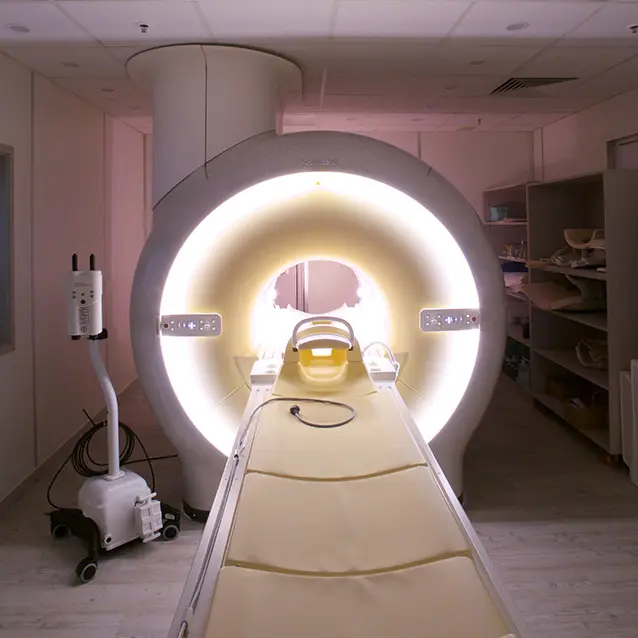
Key Screening:
- Tumors and Cancers
- Neurological Disorders
- Cerebrovascular Disease
- Musculoskeletal Disorders
- Visceral Organ Diseases
- Vascular and Lymphatic Abnormalities
- Infections or Inflammations
- Congenital Diseases or Developmental Abnormalities
Key Screening:
- Brain-related lesions
- Carotid artery-related issues
Computed Tomography (CT)

Key Screening:
- Coronary Artery Disease (CAD) / Coronary Heart Disease
- Acute Coronary Syndrome Integrated Assessment
Key Screening:
- Lung Cancer
- Benign Lung Lesions
3D Mammography
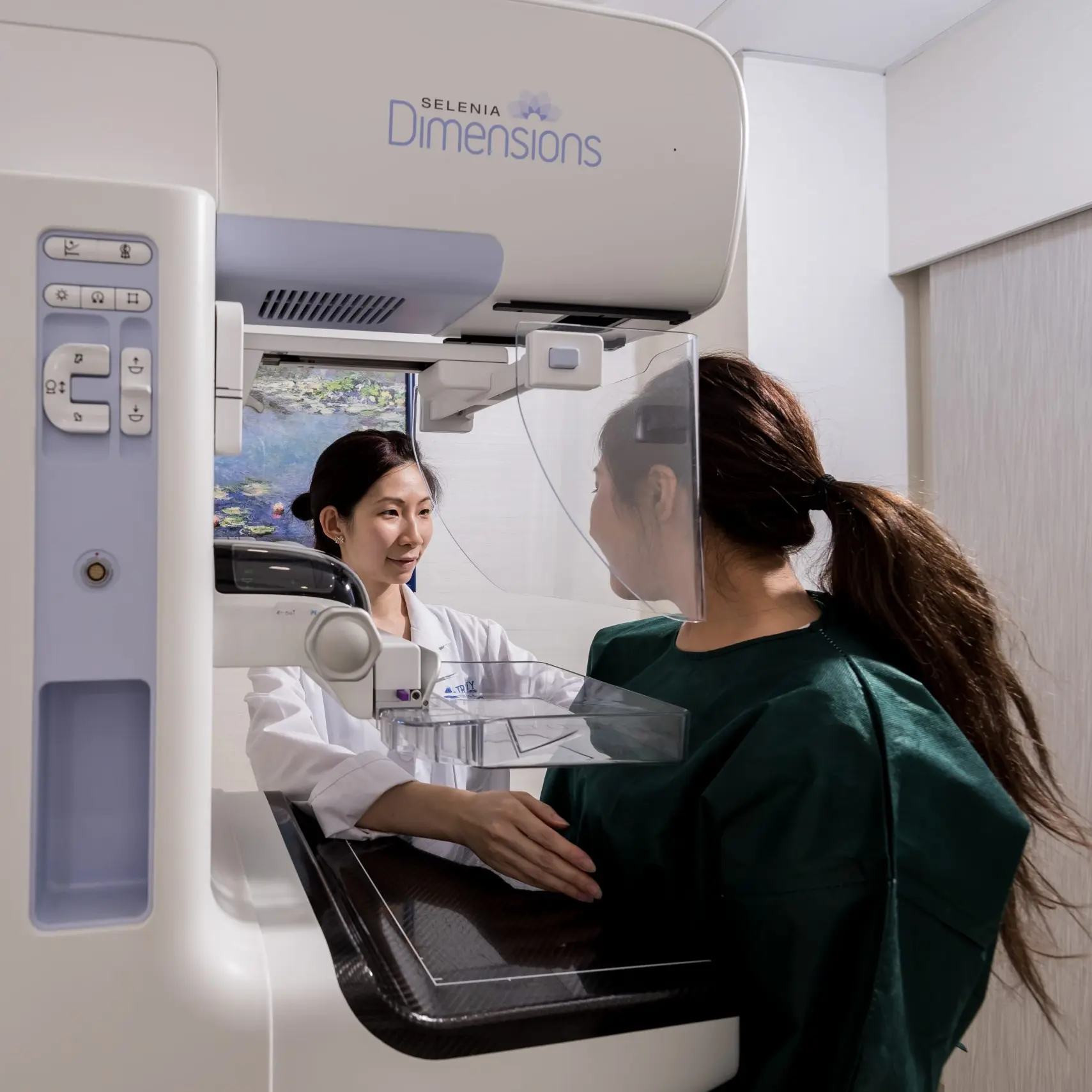
Advantages:
- Improved breast cancer detection rate: Compared to traditional 2D Mammography, 3D Mammography can detect up to 41% more invasive breast cancers, especially in women with higher breast tissue density.
- Reduction in false positive results: 3D Mammography can reduce false positive cancer results by up to 40%, reducing unnecessary repeat examinations and patient anxiety.
- Early detection of breast diseases: Able to detect pathological changes in the breast early, such as cysts or tumours, helping patients receive treatment promptly.
- Increased comfort: New technology can reduce the time spent on breast compression, improving comfort during the examination process.
Ultrasound
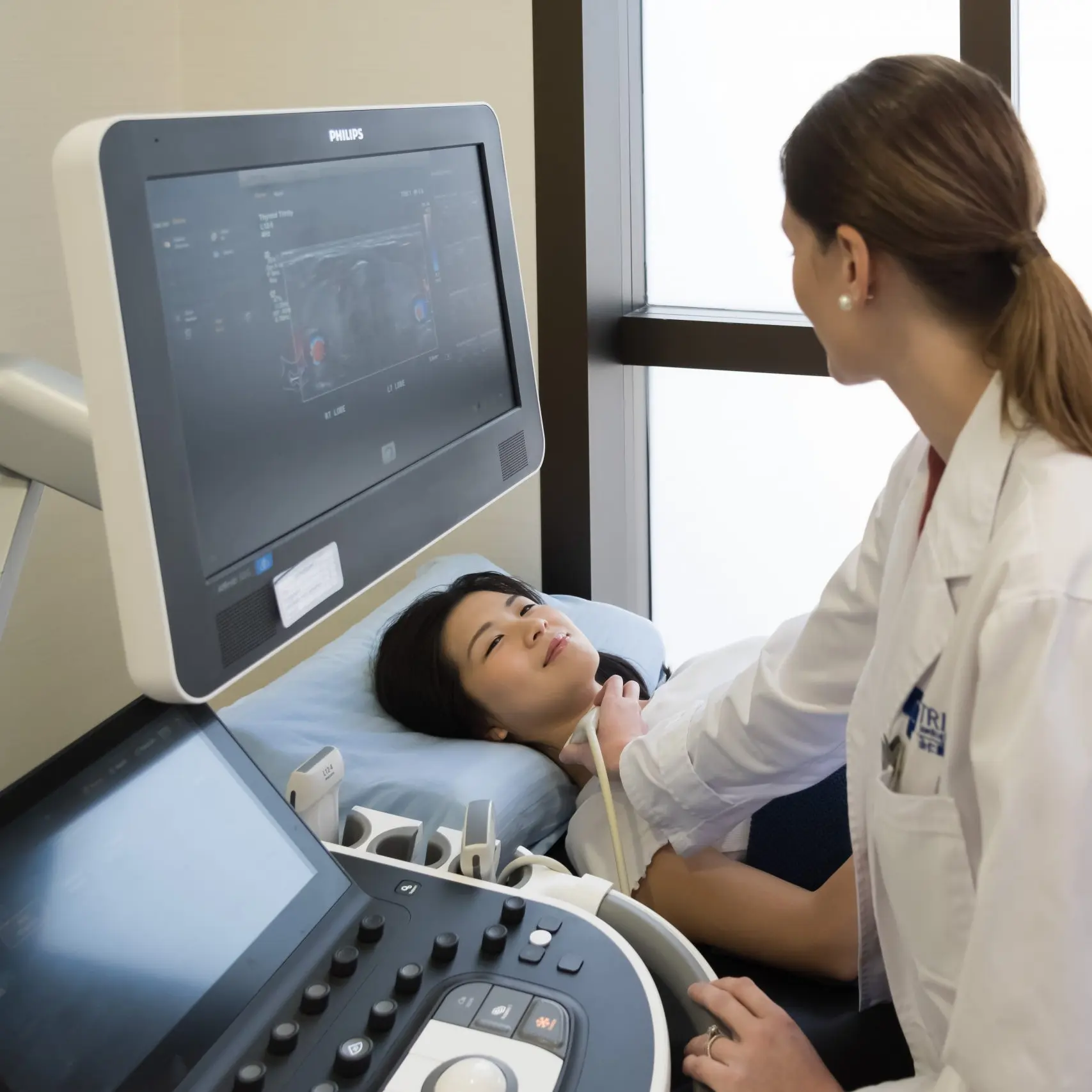
Advantages:
- Safe and radiation-free
- Real-time imaging
- Lower cost, short examination time
Screening:
- Abdominal organs: Liver, gallbladder, pancreas, spleen, kidneys, major blood vessels in the abdominal cavity, and lymph nodes. It can detect liver cancer, cirrhosis, fatty liver, liver tumours, gallstones and polyps, pancreatic inflammation and cysts, spleen enlargement, and kidney stones.
- Pelvic area: Examine the uterus and ovaries and provide preliminary diagnosis for ovarian cancer, ovarian cysts, uterine fibroids, chocolate cysts, cervical cancer, and endometriosis.
- Breasts: Examines breast health condition. More effective at detecting hidden breast cancer in women with higher breast tissue density.
- Prostate: Evaluates the prostate’s size, structure, and blood flow. Used for early detection and monitoring of prostate hyperplasia, prostate enlargement, prostatitis, and prostate cancer.
- Heart: Assesses cardiac structure and function. It can detect heart size, ventricular contraction, heartbeat, pumping strength, heart valve function, and valve movement. Helps diagnose and monitor heart disease, coronary heart disease, cardiomyopathy, congenital heart disease, and other cardiac-related conditions.
X-Ray
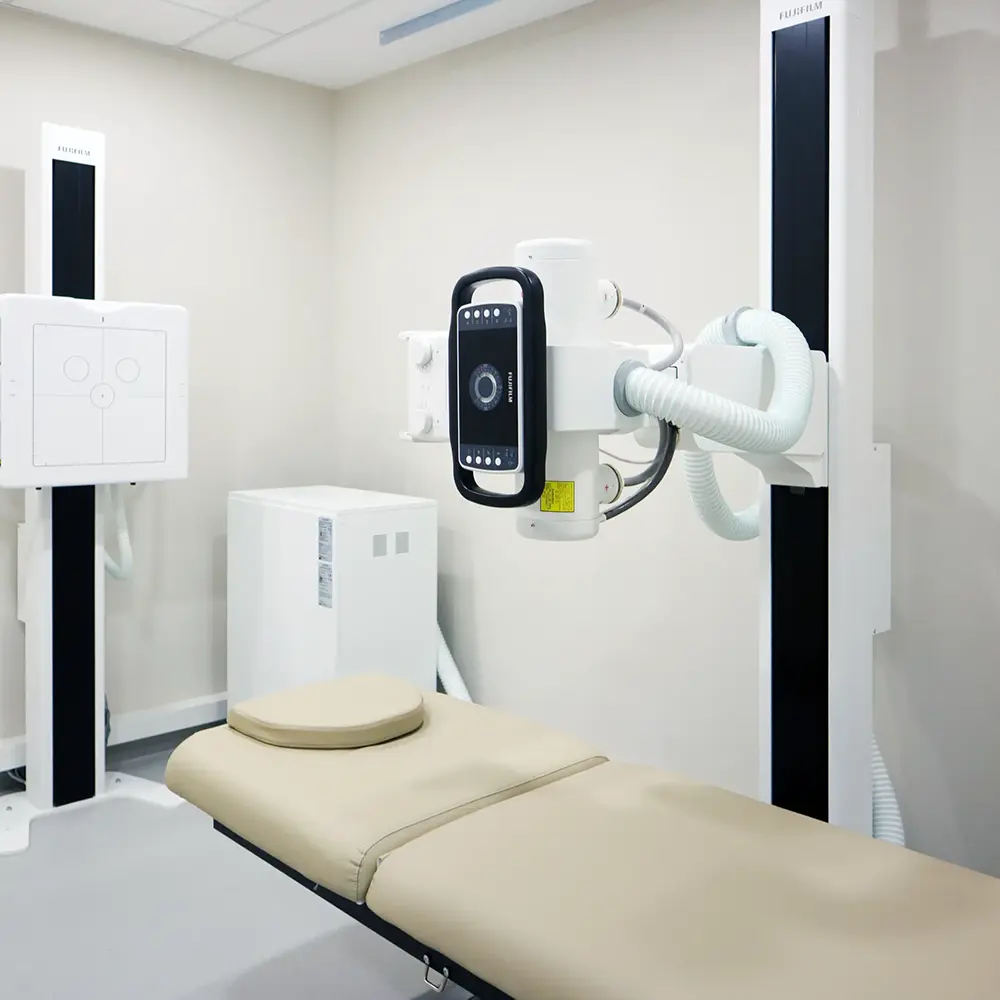
Key Screening:
- Diagnosis of bone diseases: Most commonly used to diagnose fractures, arthritis, osteoporosis, and other bone-related diseases.
- Diagnosis of lung diseases: Used to detect pneumonia, lung cancer, pulmonary oedema, tuberculosis, and other lung diseases.
- Heart and digestive tract problems: Can detect heart damage and digestive tract problems, such as gastric ulcers and intestinal obstruction.


